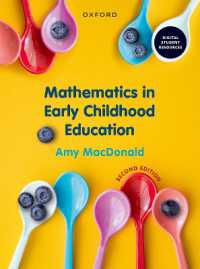- ホーム
- > 洋書
- > 英文書
- > Philosophy
Full Description
The first comparative treatment of the topic of līlā in Hindu and Christian traditions, this volume explores what it means to consider divine and human action under the categories of play, wit, drama, grace, and compassion
God at Play presents a theological exploration of the multifaceted motif of līlā across diverse Hindu and Christian landscapes and its wide-ranging connections to divine and human creativity. Given its ubiquity in Hindu theologies and life-forms, līlā offers a rich comparative framework for exploring certain ways of understanding divine and human action as expressed in Hindu and Christian sacred texts, philosophical theology, and ritual practices.
Though līlā is often interpreted simply as "play," the essays in this volume reflect a far richer semantic and conceptual field, ranging from spontaneity and gratuitousness, through joy and humor, to mercy and compassion. By focusing on the different contexts in which līlā is found in Hindu traditions and resisting any uniform translation of the term, the contributors to this volume avoid the risk of using predominantly western or Christian categories to understand the Hindu other. The volume thus explores how līlā functions in a variety of distinctive philosophical, theological, and devotional ways across Hindu traditions, and listens for echoes in Christian understandings of the gratuitousness of the created order in relation to God.
God at Play is a genuine experiment in deep learning across traditions. Each chapter reflects on what is learned by taking līlā as the category of comparison and invites the reader to think about what these conversations add, confirm, or change in relation to earlier twentieth-century scholarship on play—not least, in terms of what difference it might make to understand human life as an imitation and a participation in the divine life of a playful deity.
Contents
Introduction: God at Play: Līlā in Hindu and Christian Traditions 1
Daniel Soars
Part I: Līlā as Divine Will and Divine Creativity
1 Play in East and West 21
Douglas Hedley
2 Creating without a "Why": Divine Play as Metaphor
for Creation in John Scottus Eriugena, Thomas Aquinas, and Meister Eckhart 43
Bernard McGinn
3 God's Willand the Creative Act:
Origen on Divine Volition and the Intelligibility of the Cosmos 63
Daniel J. Tolan
Part II: Grace, Compassion, and Suffering: Some Pastoral Connotations of Līlā
4 Creation, Vision, Bliss: Līlā as Grace according to Rāmānuja, with
Reference Also to Thomas Aquinas and Gregory Palamas 89
Francis X. Clooney, SJ
5 Līlā and Divine Mercy in the Hundred Verses to Compassion of Vedānta Deśika 109
Sucharita Adluri
6 What Does It Mean for the Goddess to Play?
Līlā (or Its Absence) in the Śākta Traditions 135
Rachel Fell McDermott
Part III: Some Aesthetic and Dramatic Dimensions of Līlā
7 "You have made me endless, such is thy pleasure":
The Līlā of Love in the Metaphysical Poetry of Rabindranath Tagore 153
Ankur Barua
8 The Metaphysics of Emotion: Divine Play in Caitanya Vaiṣṇava Philosophy 178
Jessica Frazier
9 The Making of the Sacred City: Līlā as God's Violence in a Tamil Śaiva Talapurāṇam 197
Srilata Raman
Part IV: Human Playfulness as Imitation of Divine Līlā
10 Looking to the Leader: The Divine Dance in Neoplatonism 221
Stephen R.L. Clark
11 Serio Ludere! Divine Lessons from Tricksters and Holy Fools 244
Peter Tyler
12 The Serious Subject of Play: Play in Dance and Music 264
Dominic White, OP
Afterword: Divine Līlā and Human Play 289
Michelle Voss
Contributors 299
Index 303








